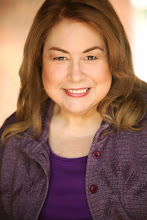Actors Fund Workshop: Leveraging Your Talent for the Next Decade
The Actors Fund is a great resource for those of us who are professionals in the entertainment business and have been working in one of the unions or guilds for a number of years. When I was laid off during the last writers strike, I eventually needed to call upon their financial aid department and they were there for me.
Yesterday, however, I attended one of their many workshops, this time held in the Valley in the soundstage of Local 80. It was called “Leveraging Your Talent for the Next Decade… and beyond” and was taught by Jonathan Tavss, a media consultant who has many years under his belt doing film and television development, management, and strategy. He has his own business of digital design called Scarlet Terrier Productions.
The first thing Jonathan reminded us was that as business entities in the Entertainment business we are different from the general population because we will never work for the same company until we retire. He also reminded us that in other industries, the steps we need to go through to get what we want are usually laid out, but in entertainment, there are many steps sideways that can lead us to our goal even without looking like the appropriate path. He was inspiring when he said, “When I see what I want, I go after it.” The encouraging example he gave was that when he started out and wanted to be in theater, he kept bugging the manager until he hired him.
Also encouraging was the way he managed to fulfill his desire to work in development, when he kept losing out to those with agency experience. He figured he had to get agency experience and got hired at ICM, looking at working there as his graduate school. He made the experience work for him, even if it wasn't where he most wanted to be.
A big axiom of his that we should also take to heart is this: At the point where you are not able to be yourself, it’s time to rethink what you want to do. Figure out what goal would make you the happiest. He mentioned the Myers Briggs personality test is good to take to see how others perceive you but it is expensive and hence, cautioned us to not pass it up any time it’s offered to us.
Another is one we all know, but bears repeating every day: Remember that people aren’t looking at how they can help us, but how we can help them. Anyone who hires is looking for a person who can convince him that he/she can help him increase his business.
You must deliver consistently in what you do so that people who hire you know what to expect. But you also need to first decide, who do I work with best?
He shared with us his ground rules for moving forward:
What can I bring in from my past that I can incorporate into what I do?
What is your ‘company’?
How can you do what you love to do? Or what your friends love you to do?
In communicating, you need to know what your pitch is.
And it’s important to develop renewal friendships to work with again and again.
Finding and developing talent for your team is a challenge because there are no real apprenticeships in most parts of the entertainment industry, so to know how to ask for help is often not easy.
Forming alliances are crucial in this business, but partnerships are where you get what you need but also have something to give back.
Common pitfalls of partnerships are expecting everything, holding back, and not being honest. People feel that if they are working with someone who has more clout or cred in the industry, then they have no power and are at the mercy of the person whom they need. But remember that they need you, too, because you came in with the idea. You are not totally at their mercy. But it is best to have a legal contract delineating what you expect to get out of the partnership. Festering feelings are detrimental, so partners need to be clear and always communicating. Don’t let things fester. Don’t go into meeting and just wing it. Have backup plans. If things change so you don’t know where you are going, take five minutes to think about it and then go with your instinct.
Jonathan gave really good advice on broadening our networks, advising us to join affinity groups outside your industry (non-business extensions, meaning non-profit work) where we’re not immediately looking for work, but are getting together with like-minded people. Often down the line, they do lead to work. He cautioned us not to do is talk business at these events. One time he took out paper and took down the number to call a heavy-hitter at work. This made for a very awkward situation. What he should have done was let it play out so that later when the two of them met up, he could say where they met. Now, he never puts out a guest list so that people can’t make a hit list.
He also emphasized the importance of excellent support staffs, of accountants, agents, lawyers, family and friends.
We left this informative workshop with a few final principal thoughts. Goals are a must because without knowing where we are going, we can’t start. Yet we also must be flexible within our mission statement. We can change it as long as we stay true to ourselves.
Labels: Actors Fund Workshop, Jonathan Tavss


0 Comments:
Post a Comment
<< Home